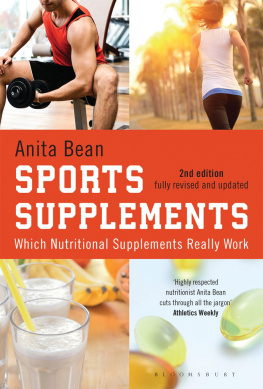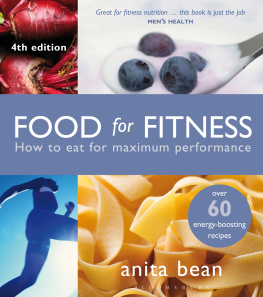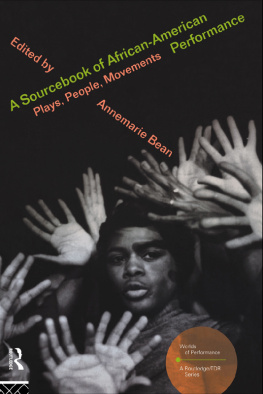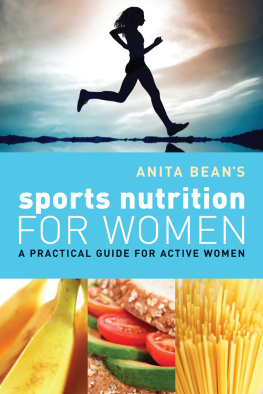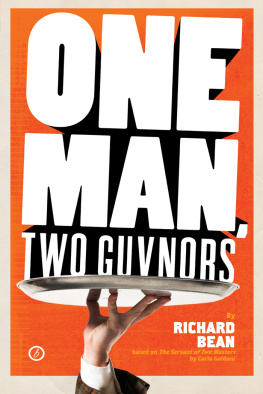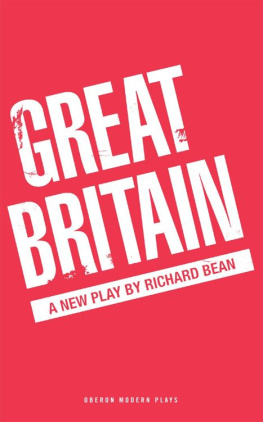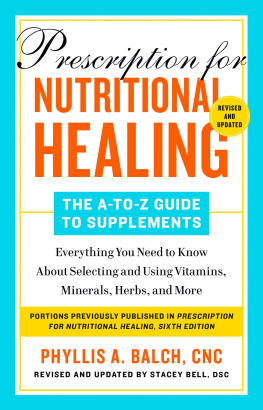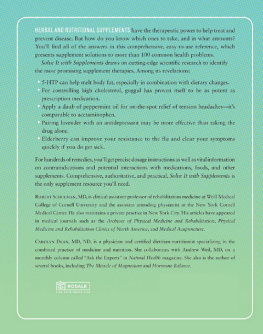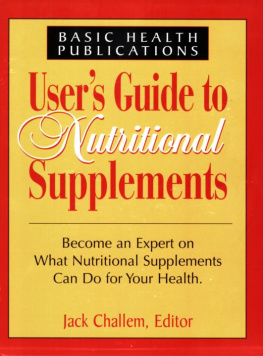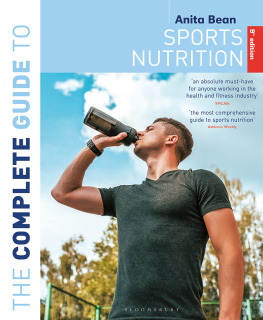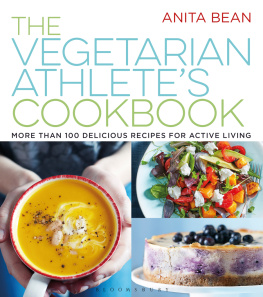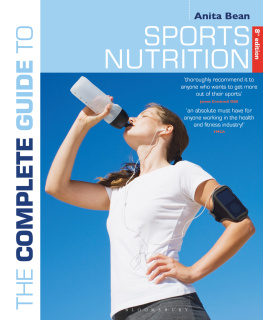
Note
While every effort has been made to ensure that the content of this book is as technically accurate and as sound as possible, neither the author nor the publishers can accept responsibility for any injury or loss sustained as a result of the use of this material.
Published by Bloomsbury Publishing Plc
50 Bedford Square
London WC1B 3DP
www.bloomsbury.com
Bloomsbury is a trademark of Bloomsbury Publishing plc
Second edition 2015
This electronic edition published in 2015 by Bloomsbury Publishing Plc
Copyright 2015 Anita Bean
First edition published in 2007
ISBN (print): 9781472909664
ISBN (epub): 9781472911452
ISBN (epdf): 9781472911582
All rights reserved
You may not copy, distribute, transmit, reproduce or otherwise make available this publication (or any part of it) in any form, or by any means (including without limitation electronic, digital, optical, mechanical, photocopying, printing, recording or otherwise), without the prior written permission of the publisher. Any person who does any unauthorised act in relation to this publication may be liable to criminal prosecution and civil claims for damages.
Anita Bean has asserted her rights under the Copyright, Design and Patents Act, 1988, to be identified as the author of this work.
A CIP catalogue record for this book is available from the British Library.
Acknowledgements
All inside page references are as per the print edition.
Cover photographs Shutterstock
Inside photographs Shutterstock.com with the exception of the following:
;
;
;
;
Getty images
Commissioning Editor: Charlotte Croft
Editor: Sarah Cole
To find out more about our authors and books visit www.bloomsbury.com. Here you will find extracts, author interviews, details of forthcoming events and the option to sign up for our newsletters.
CONTENTS
INTRODUCTION

Since the publication of the first edition of Sports Supplements, the number of pills, potions and supplements promising performance enhancement has continued to grow unabatedly. And were spending more on them than ever before. Globally, the market was worth $20.7 billion in 2012 and is forecast to reach $37.7 billion in 2019. It seems that sports supplements are no longer only the domain of bodybuilders and hard-core athletes; they are now sold in supermarkets and high street shops, as well as gyms, health stores and through the internet. They have become mainstream.
The trouble is, with the multitude of products on the market, separating hype and fact isnt easy. Many supplements are advertised alongside impressive testimonials or celebrity endorsements, which can make the products claims appear very convincing. Manufacturers often promise dramatic results, pepper their adverts with technical jargon and cite studies cherry-picked to back their claims. All this makes it difficult to know the truth about a product and whether it really works.
Whats more, there is no systematic regulation of sports supplements, which means theres no guarantee that a supplement lives up to its claims or doesnt contain banned substances. Most sports organisations, including the International Olympic Committee (IOC), UK Sport, and the US National Collegiate Athletic Association (NCAA) have developed policies on sports supplements and caution athletes against their use. However, in the real world many people prefer to consider the pros and cons of taking supplements, notwithstanding such risk.
In this second edition, I have added many new products and sifted through hundreds of scientific studies on sports supplements to cut through the hype and find out what works. The result is an independent evaluation of the most popular sports supplements. It will provide you with relevant and evidence-based advice so that, if you are considering taking supplements, then you will be able to make properly informed decisions.
Anita Bean
March 2015
Transparency Market Research, 2014.
PART ONE
THE SCIENCE OF SUPPLEMENTS
WHAT ARE SPORTS SUPPLEMENTS AND ERGOGENIC AIDS?
Sports supplements are a category of nutritional supplements whose purpose is to serve as an addition to the normal diet to improve general health and wellbeing or enhance sporting performance.
Supplements may include tablets, capsules, powders, drinks and bars, which claim to help with building muscle; increase endurance, weight gain or loss; improve suppleness; rehydrate; aid recovery or overcome a mineral deficiency.
Ergogenic aids are defined as any external influence created to enhance sport performance. They can include sports supplements as well as illegal drugs and methods.
The idea that certain substances or food ingredients enhance sports performance is certainly not new. In the ancient Greek Olympic Games 4000 years ago, athletes were reported to consume deer liver and lion heart to increase their speed, bravery and strength. Clearly, such practices were unfounded scientifically and based purely on belief, but they do underline the inherent desire in athletes to gain the competitive edge.
Nowadays athletes are faced with a bewildering choice of pills, potions, powders, drinks and bars promising greater stamina, increased strength, quicker recovery or less body fat. Some are supported by scientific evidence; many others are not. The question is how do you know if they are safe, effective and legal? Unfortunately, its not easy. Unlike medicines, theres no systematic regulation of sports and other dietary supplements, or herbal remedies, so theres no way of knowing exactly whats in the product, nor any guarantee that a supplement works. Provided the supplement label lists the ingredients, manufacturers are free to make claims for enhanced performance, valid or not. Whats more, advertising standards vary between different countries so some claims may be untrue or exaggerated. The trick is knowing which ones if any you should take, whether the product contains whats on the label and whether it lives up to its claims.
IOC CONSENSUS STATEMENT ON SPORTS NUTRITION (IOC, 2011)
The use of supplements does not compensate for poor food choices and an inadequate diet, but supplements that provide essential nutrients may be a short-term option when food intake or food choices are restricted due to travel or other factors. Vitamin D may be needed in supplemental form when sun exposure is inadequate. Of the many different dietary ergogenic aids available to athletes, a very small number may enhance performance for some athletes when used in accordance with current evidence under the guidance of a well-informed professional. Athletes contemplating the use of supplements and sports foods should consider their efficacy, their cost, the risk to health and performance and the potential for a positive doping test. Supplement use in young athletes should be discouraged and the focus should be on consuming a nutrient-rich, well-chosen diet to allow for growth while maintaining a healthy body composition.

HOW WIDESPREAD IS THE USE OF SPORTS SUPPLEMENTS?
Many athletes believe supplements are an essential component for sports success and it has been estimated that the majority of elite athletes are using some form of performance-enhancing agent. A Canadian study of 440 elite male and female athletes found that 87 per cent used supplements regularly (Lun
Next page
